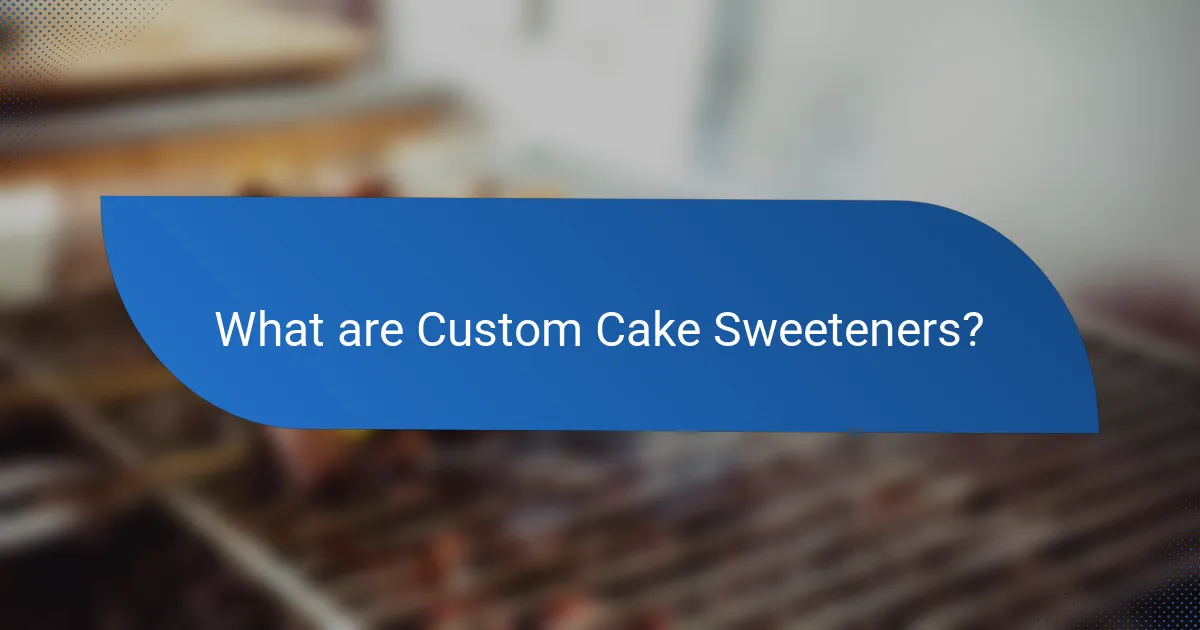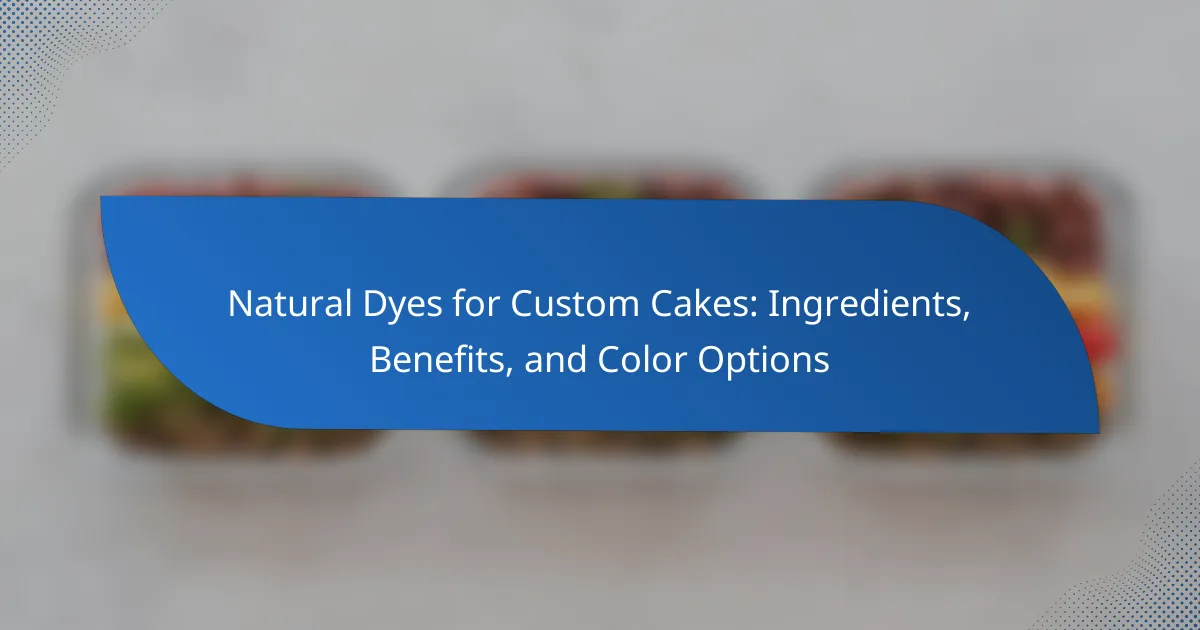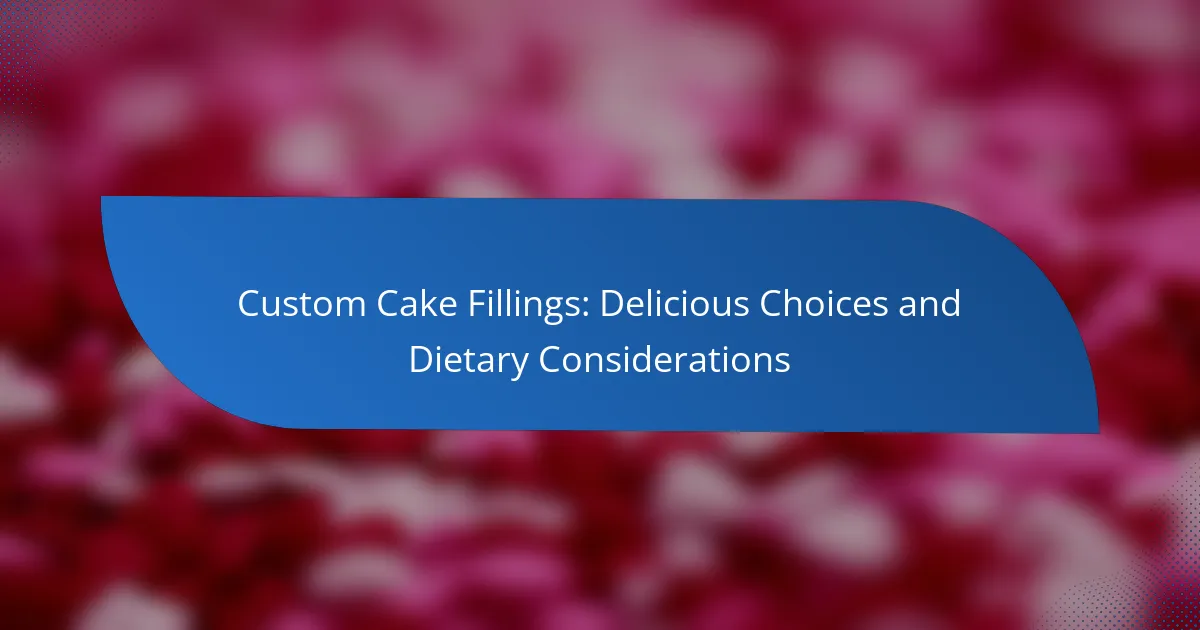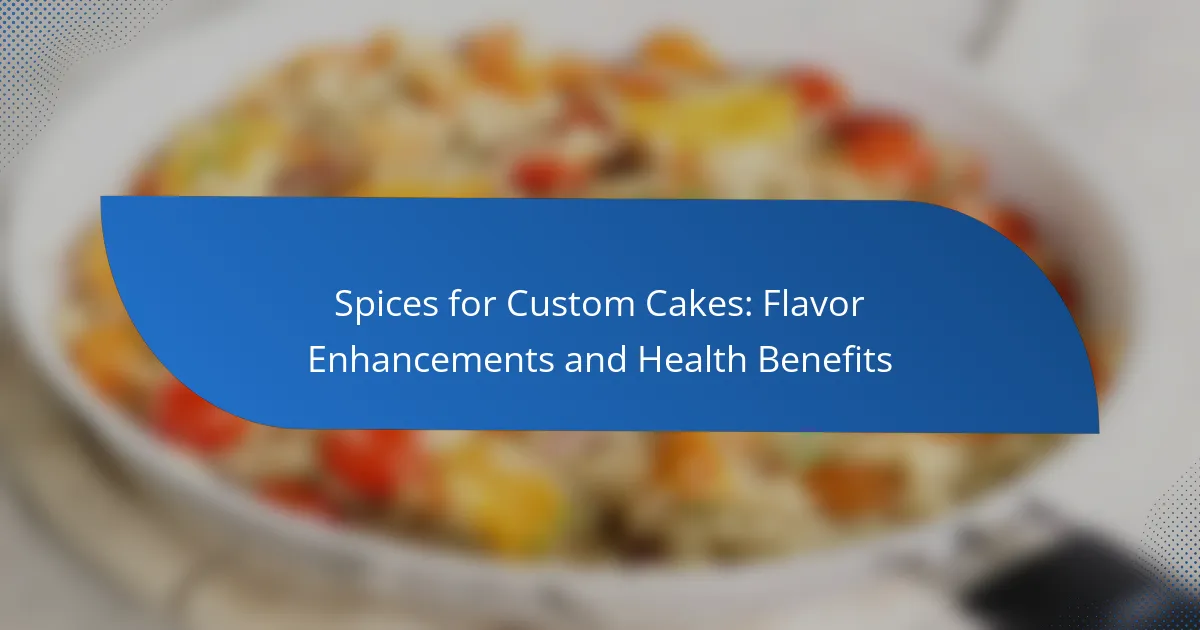Custom cake sweeteners are specialized sweetening agents used in cake recipes, offering alternatives to traditional sugar. These sweeteners can be natural, such as stevia and agave syrup, or artificial, like erythritol, each with unique properties that influence taste and texture. They provide enhanced sweetness with fewer calories, catering to various dietary needs, including low-sugar and diabetic-friendly options. The article will explore different types of custom cake sweeteners, their health benefits, and practical usage tips for effective baking.

What are Custom Cake Sweeteners?
Custom cake sweeteners are specialized sweetening agents designed for use in cake recipes. They can be natural or artificial, providing alternatives to traditional sugar. These sweeteners aim to enhance sweetness without the calories associated with sugar. Common types include stevia, erythritol, and agave syrup. Each sweetener has unique properties affecting taste and texture. For instance, stevia is derived from a plant and is calorie-free. Erythritol is a sugar alcohol that contributes minimal calories. Custom cake sweeteners allow for tailored sweetness levels in baking. They cater to various dietary needs, including low-sugar and diabetic-friendly options.
How do Custom Cake Sweeteners differ from traditional sweeteners?
Custom cake sweeteners differ from traditional sweeteners in their formulation and intended use. Custom cake sweeteners are often designed to provide specific taste profiles and functionalities tailored for baking. They can include a blend of natural and artificial sweeteners, providing unique flavors and textures. Traditional sweeteners, like sugar, are primarily sucrose and have a consistent sweetness level.
Custom sweeteners may also have lower calories or different glycemic responses compared to traditional options. For instance, some custom sweeteners are formulated to be diabetic-friendly, while traditional sweeteners can spike blood sugar levels. Additionally, custom sweeteners can enhance moisture retention in cakes, improving texture. This contrasts with traditional sweeteners, which don’t offer this specific baking benefit.
What are the key characteristics of Custom Cake Sweeteners?
Custom cake sweeteners are designed to enhance the sweetness of cakes while offering various benefits. They typically have low or zero calories compared to traditional sugars. Many custom sweeteners are made from natural sources like stevia or erythritol. These sweeteners can provide a similar taste profile to sugar without the associated calories. They are often suitable for diabetic individuals, as they have minimal impact on blood sugar levels. Additionally, custom cake sweeteners can be used in different forms, such as liquid, powder, or granules. Their solubility varies, affecting how they blend into cake batters. Some custom sweeteners also have unique flavors that can complement specific cake recipes.
Why choose Custom Cake Sweeteners for baking?
Custom Cake Sweeteners are ideal for baking due to their ability to provide sweetness without added calories. They often contain natural or low-calorie ingredients, making them suitable for health-conscious bakers. Many Custom Cake Sweeteners also have a similar texture to sugar, ensuring a consistent baking result. Additionally, they can enhance flavor profiles without the negative effects of traditional sugar. For instance, some sweeteners are made from stevia or erythritol, which are known for their low glycemic index. This means they do not spike blood sugar levels, making them a better choice for diabetics. Their versatility allows them to be used in various recipes, from cakes to cookies, without compromising taste.
What types of Custom Cake Sweeteners are available?
The types of custom cake sweeteners available include granulated sugar, brown sugar, honey, agave nectar, maple syrup, and artificial sweeteners. Granulated sugar is a common choice for its sweetness and texture. Brown sugar adds moisture and a slight molasses flavor. Honey is a natural sweetener that can enhance flavor profiles. Agave nectar is sweeter than sugar and has a lower glycemic index. Maple syrup offers a distinct flavor and is often used in specialty cakes. Artificial sweeteners, such as stevia and aspartame, provide sweetness with fewer calories. Each type has unique properties that affect the cake’s taste and texture.
What are natural sweeteners, and how are they used in custom cakes?
Natural sweeteners are substances derived from plants or natural sources that provide sweetness without refined sugars. They include options like honey, maple syrup, agave nectar, and stevia. In custom cakes, natural sweeteners are used to replace traditional sugars for various reasons. They can enhance flavor profiles and add unique tastes to the cake.
Natural sweeteners also offer potential health benefits, such as lower glycemic indexes compared to refined sugars. For instance, honey has antibacterial properties and can add moisture to cakes. Additionally, natural sweeteners can accommodate dietary preferences, such as vegan options with agave nectar.
Baking with these sweeteners may require adjustments in recipes, as they can differ in sweetness levels and moisture content. Understanding their characteristics helps achieve the desired sweetness and texture in custom cakes.
What are artificial sweeteners, and what benefits do they offer?
Artificial sweeteners are synthetic sugar substitutes that provide sweetness with little to no calories. They are often used in food and beverages to reduce sugar intake. Common types include aspartame, sucralose, and saccharin. These sweeteners are much sweeter than regular sugar, so only small amounts are needed. Benefits of artificial sweeteners include weight management, as they help reduce calorie consumption. They may also help individuals with diabetes manage blood sugar levels. Studies, such as one published in the “American Journal of Clinical Nutrition,” indicate that artificial sweeteners can aid in weight loss efforts.
How do sugar alcohols function as Custom Cake Sweeteners?
Sugar alcohols function as custom cake sweeteners by providing sweetness with fewer calories than sugar. They are commonly used in baking due to their ability to mimic the texture and taste of sugar. Sugar alcohols, such as erythritol and xylitol, contribute to the overall sweetness while having a lower glycemic index. This makes them suitable for low-sugar and diabetic-friendly recipes. Additionally, they retain moisture in baked goods, enhancing texture. Research shows that erythritol has about 70% of the sweetness of sucrose but only 0.24 calories per gram. This characteristic allows for reduced caloric intake while maintaining flavor.
What are the health benefits of using Custom Cake Sweeteners?
Custom cake sweeteners offer several health benefits. They can significantly reduce calorie intake compared to traditional sugars. This reduction aids in weight management and can support overall health. Many custom sweeteners have a lower glycemic index. This property helps in maintaining stable blood sugar levels. Some sweeteners are derived from natural sources, providing additional nutrients. For instance, stevia contains antioxidants that may promote health. Additionally, custom sweeteners can be beneficial for individuals with diabetes. They allow for sweeter treats without the blood sugar spikes associated with regular sugar.
How can Custom Cake Sweeteners support dietary restrictions?
Custom cake sweeteners can effectively support dietary restrictions by offering alternatives to traditional sugars. They are designed to cater to specific needs, such as low-calorie, low-carb, or sugar-free diets. For individuals with diabetes, sweeteners like stevia and erythritol provide sweetness without raising blood sugar levels. Gluten-free options are available, ensuring those with celiac disease can enjoy desserts. Additionally, many custom sweeteners are suitable for vegan diets, as they do not contain animal products. These sweeteners can also be tailored for those with allergies, avoiding common allergens like gluten or dairy. By providing diverse options, custom cake sweeteners enable individuals to adhere to their dietary restrictions while still enjoying sweet treats.
What role do Custom Cake Sweeteners play in weight management?
Custom cake sweeteners can aid in weight management by providing sweetness with fewer calories than traditional sugars. These sweeteners often have little to no calories, allowing individuals to enjoy desserts without significantly increasing their caloric intake. Research indicates that replacing sugar with low-calorie sweeteners can help reduce overall calorie consumption. For example, a study published in the “American Journal of Clinical Nutrition” found that participants who consumed low-calorie sweeteners experienced less weight gain compared to those who consumed regular sugar. Additionally, custom cake sweeteners can satisfy sweet cravings, potentially reducing the desire for high-calorie snacks. This can contribute to better adherence to weight management goals.
How do Custom Cake Sweeteners impact blood sugar levels?
Custom cake sweeteners generally have a minimal impact on blood sugar levels. Many of these sweeteners, such as stevia and erythritol, are low in calories and carbohydrates. Research indicates that they do not cause significant spikes in blood glucose. For example, a study published in the journal “Nutrition Reviews” found that stevia can lower blood sugar levels in certain contexts. Additionally, erythritol is absorbed by the body but not metabolized, leading to negligible effects on blood sugar. Overall, custom cake sweeteners can be a viable option for those managing blood sugar levels.
What are the best practices for using Custom Cake Sweeteners?
Use Custom Cake Sweeteners in moderation to achieve the desired sweetness without overwhelming flavors. Measure sweeteners carefully, as they often have different sweetness levels compared to sugar. Incorporate them gradually into your batter, tasting as you go to ensure balance. Adjust other ingredients, such as liquids, to maintain the correct texture. Always check the specific conversion guidelines for each sweetener, as they vary widely. Store sweeteners in a cool, dry place to maintain their effectiveness. Experiment with combinations of sweeteners for enhanced flavor profiles. Lastly, consider the baking temperature and time, as some sweeteners may affect these factors.
How can you effectively substitute Custom Cake Sweeteners in recipes?
To effectively substitute Custom Cake Sweeteners in recipes, determine the type of sweetener you are replacing. Different sweeteners have varying sweetness levels and properties. For example, if using a granular sweetener, consider using a similar granulated sugar alternative. Measure the substitution according to sweetness equivalence; typically, one cup of sugar equals three-quarters cup of a liquid sweetener. Adjust the liquid content in the recipe to maintain consistency. For powdered sweeteners, a one-to-one ratio often applies. Always taste the batter or mixture before baking to ensure desired sweetness. Various sweeteners may also affect texture and moisture, so some experimentation may be necessary.
What tips can enhance the taste of cakes made with Custom Cake Sweeteners?
Use high-quality Custom Cake Sweeteners for better flavor. Opt for sweeteners that mimic sugar’s taste closely. Combine sweeteners with natural flavor enhancers like vanilla or almond extract. Incorporate moist ingredients such as yogurt or applesauce to enhance texture and taste. Experiment with spices like cinnamon or nutmeg for added depth. Adjust baking times as needed, since sweeteners can affect moisture levels. Use a pinch of salt to balance sweetness and enhance overall flavor. Finally, allow the cake to cool completely for improved taste development.
How can you troubleshoot common issues with Custom Cake Sweeteners?
To troubleshoot common issues with custom cake sweeteners, first identify the specific problem. If the cake is too sweet, reduce the amount of sweetener used. If the texture is off, consider adjusting the ratio of sweetener to other ingredients. For issues with dissolving, ensure the sweetener is fully incorporated before baking. If an aftertaste is present, switch to a different type of sweetener. Monitor baking times, as some sweeteners may alter the cooking duration. For moisture issues, adjust liquid ingredients accordingly. Always check the packaging for specific usage instructions and recommendations. These steps help ensure optimal results when using custom cake sweeteners.
What are the common pitfalls when using Custom Cake Sweeteners?
Common pitfalls when using custom cake sweeteners include incorrect measurement, which can lead to overly sweet or bland cakes. Many bakers underestimate the sweetness potency of these sweeteners. This can result in cakes that do not meet taste expectations. Another issue is the varying baking properties of sweeteners. Some sweeteners do not caramelize or brown like sugar, affecting texture. Additionally, certain sweeteners can impart an aftertaste that may not be desirable in baked goods. Using incompatible sweeteners can also lead to poor texture or density. Lastly, not considering the moisture content of sweeteners can affect the overall hydration of the cake batter.
How can you adjust recipes to improve the texture of cakes with Custom Cake Sweeteners?
To improve the texture of cakes with Custom Cake Sweeteners, adjust the liquid ratios in the recipe. Custom Cake Sweeteners often have different moisture retention properties compared to traditional sugars. Increase the liquid ingredients, such as milk or water, by about 10% to compensate. This adjustment helps maintain a moist crumb.
Additionally, consider incorporating ingredients that enhance texture, like yogurt or sour cream. These ingredients can add richness and moisture. Also, reduce the leavening agents slightly, as some sweeteners can create more lift.
Testing different sweeteners is essential, as each may behave uniquely in recipes. For example, erythritol can lead to a drier texture compared to agave syrup. Adjusting these factors can significantly enhance the overall cake texture.
Custom cake sweeteners are specialized sweetening agents used in cake recipes, offering alternatives to traditional sugar with lower or zero calories. This article covers the types of custom cake sweeteners, including natural and artificial options, and their unique properties that affect taste and texture. Key health benefits include support for dietary restrictions, weight management, and minimal impact on blood sugar levels, making them suitable for various dietary needs. Additionally, the article provides tips for effective usage, recipe adjustments, and troubleshooting common issues when baking with these sweeteners.



